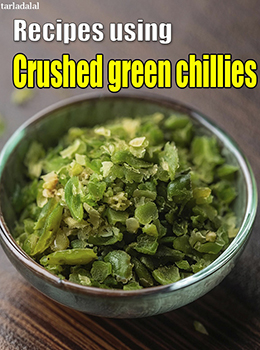Chillies are the life and soul of a hearty Indian meal. You don't necessarily have to overdo it until smoke comes out of your ears, but without a touch of chilli, dishes seem incomplete. We can't think of Indian cooking without a dash of green chillies. Slit, sliced, chopped or diced, we just have to add a few green chillies to add that spicy and tang flavour to our food. A green chilli is an important star in Indian cooking. This spice is grown throughout the year and so there is no scarcity and a good quantity is exported. Green chillies are available fresh, dried, powdered, flaked, in oil, in sauce, bottled and pickled. It spices up a bland meal.
![]()
Pick some fresh from your vegetable patch, pick up a packet of chillies from the supermarket or just ask the vegetable vendor to add a few free ones to your vegetable bag Fresh unripe chillies come in various shades of green from lime to olive. While buying fresh chillies look for crisp unwrinkled ones. Make sure they are bright and unbroken. Store them in a container in the fridge or in a cool, dry place.
Chopped green chilli

Clean and wash the green chillies with water and dry with a kitchen towel. Remove the stems and discard them. Place a few green chillies on a chopping board and chop finely or roughly using a sharp knife. It can be used for tempering in dal or vegetables.
Crushed green chillies

Clean and wash the green chillies with water and dry with a kitchen towel. Remove the stems and discard them. Green chillies can be crushed by using pestle and mortar or mixer. Crush them as required, partially or fully.
Fried green chillies

Deep-fried chillies are a popular accompaniment in Indian cuisine. Many street foods like Vada pav, Bhajji pav, Methi na Gota etc. are served with deep-fried chillies. To make deep-fried chillies, wash and pat dry the green chillies thoroughly. Heat oil in a deep pan and deep-fry the green chillies till they become crisp and slightly whitish in colour. Drain on absorbent paper and serve.
Sliced green chillies

Clean and wash the green chillies with water and dry with a kitchen towel. Remove the stems and discard them. Place a green chilli on a chopping board and slice it using a sharp knife by cutting vertically across the board. Slice them thinly or thickly as the recipe requirement.
Culinary Uses of green chillies, hari mirch in Indian Cooking
· Green Chillies are popular or essential in Indian cooking for almost all savory dishes like curries, dals, breads and appetizers.
· The Indian Bhuna or cooking starter is a stir fry of onions, tomatoes, ginger, garlic, green chilies, and oil.
· The Tadka is a stir fry of on oil of asafetida, cumin seeds, and chilli powder and green chilies.
· The hara Masala or green seasoning blend has a blend of ginger, garlic and green chilies and is added to the base of curries along with the cook's choice of spices and herbs. This salsa recipe is perfect if you are looking for a different dip for your next party. It goes well with potato chips but nachos tend not to break as easily when dipped. Enjoy our Tomato and Green Chilli Salsa recipe
How to store green chillies, hari mirch
These should be crisp and bright when purchased and have no spots that might be going bad. Leave them out on a counter for a couple of hours to make sure they don't have excess surface water, then bag loosely in plastic (the bag should be able to breath) or paper or netted bags. Store in the refrigerator, will stay good for 2 weeks.
Health benefits of green chillies, hari mirch
Antioxidant
vitamin C in
green chillies protects the body from effects of harmful free radicals and prevents stress. It is probably the
high fiber which helps in controlling blood sugar levels. This it is a welcome addition to a
diabetic diet. Suffering from
anaemia? Add green chillies to your list of
iron rich foods too. For complete details see
benefits of green chilli.
Nutritive Information for Green Chillies:1 Cup of green chillies is about 80 grams
RDA stands for Recommended Daily Allowance.
Energy – 23 calories
Protein – 2.8 g
Carbohydrate – 2.4 g
Fat – 0.5 g
Fiber – 5.4 g
Vitamins:140 mcg of
Vitamin A = 2.91% of RDA (about 4800 mcg)
0.15 mg of
Vitamin B1 (Thiamine) = 9.37% of RDA ( (about 1.2 to 1.6 mg for men)
0.31 mf of
Vitamin B2 (Riboflavin) = 16.3% of RDA (about 1.4 to 1.9 mg for men)
0.72 mg of
Vitamin B3 (Niacin) = 6% of RDA (about 12mg)
88.8 mg of
Vitamin C = 222% of RDA (about 40 mg)
23.2 mcg of
Folate (Vitamin B9) = 23.2% of RDA (about 100 mcg)
Minerals:3.52 mg of
Iron = 17.6% of RDA (20 mg for women)
24 mg of
Calcium = 2.4% of RDA (about 1000 mg)
218 mg of
Magnesium = 62.2% of RDA (about 350 mg)
64 mg of
Phosphorus = 10.6% of RDA (about 600 mg)
1.42 mg of
Zinc = 11.8% of RDA (10 to 12 mg)